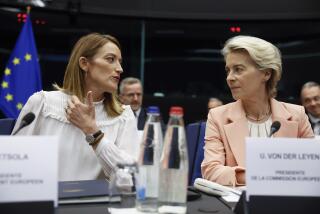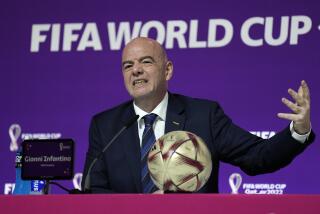EU’s Merger Umpire Keeps His Eye on the Big Picture
- Share via
BRUSSELS — If you’re Microsoft, Sprint, UAL or any of a number of other U.S. companies, the most important--even feared--man in all Europe can be found here, at 70 Joseph II St.
“Unfortunately, I’m not an interesting person,” Mario Monti warned an interviewer with a self-deprecating chuckle.
For the record:
12:00 a.m. Feb. 11, 2001 For the Record
Los Angeles Times Sunday February 11, 2001 Home Edition Business Part C Page 2 Financial Desk 1 inches; 20 words Type of Material: Correction
Mario Monti--A story in the Feb. 4 Business section on Mario Monti, the European Union minister for competition, misstated his age. He is 57.
Yet this seemingly strait-laced northern Italian with a puckish wit is so powerful and influential that he has been nicknamed “Super Mario.” The sole son of a Milan bank-branch manager and himself a respected economist, Monti, 67, is the European Union’s chief umpire for deciding what constitutes fair play in the increasingly global and intertwined world of business.
He has proved to have his unexpected side--and not just in his preference for sushi over spaghetti. He has turned out to be a tough player in his role as Europe’s top antitrust enforcer, to the surprise of some who might have been taken in by his soft-spoken style or background in academia.
As EU commissioner for competition, Monti’s professed mission is “to be an arbiter who tries to be as little arbitrary as possible.” Since September 1999, the courtly former professor has been the gatekeeper whom corporations, European or otherwise, must get by if they are part of a proposed merger or acquisition that might have major consequences for EU consumers.
He shot down three proposed mergers in his first year in office, compared with only 10 in the decade since the EU created its merger task force. Now he is seeking wider investigative powers to be able to raid executives’ homes to hunt for incriminating documents and computer files. At the moment, his staff can search only workplaces.
In Germany, he may be the most unpopular of the 20 European Union commissioners for his insistence on limiting government aid to business and on enforcing competition even in sectors in which the state has traditionally played a role, such as banking.
Yet he has managed to win high marks from U.S. government officials and even the European and American business communities for not promoting the interests of European business over others’--the complaints of some U.S. politicians notwithstanding.
Willard Berry, president of the European-American Business Council, an organization funded by companies on both sides of the Atlantic, said that from the viewpoint of business, Monti is doing “a remarkable job.”
“Europe has more of a socialist kind of ethos, if you will, which means more state aid, and subsidies are more common,” Berry said from the council’s Washington headquarters. “But essentially, we have systems that are becoming more and more integrated. How [U.S. and European antitrust officials] approach the problems are the same, and I think they have common goals.”
Though born in a country with a notoriously clubby business environment and, as he puts it, a history of “political contamination” of the economy, Monti has made his mark both in Italy and Brussels as a champion of the market, consumer rights and the need to curb state spending. A macroeconomist who undertook postgraduate studies at Yale University, Monti calls himself a firm believer in the virtues of capitalist competition as well as the role of regulation in creating a “level playing field.”
In Italy, some dubbed him “The German” for his seemingly monetarist inflexibility. For more than a decade and a half, he wrote editorials on economics for the newspaper Corriere della Sera and was a “thorn in the side” of free-spending government ministers, weekly Italian newsmagazine Panorama said.
His tenure in Brussels has continued the European Union’s gradual shift in emphasis away from protecting businesses and jobs to upholding the welfare of the consumer.
“It seems to me that overriding concern about consumer interest is the driving start of competition policies,” Monti said in an interview. “Something perhaps that, over the decades, Europe has learned from the United States, rather than vice versa.”
It’s only since September 1990 that the European Commission, the EU’s executive body, has had the power to rule on mergers. In contrast, pioneering U.S. antitrust legislation is exactly 100 years older.
Monti’s goal is to make the development of European antitrust policy, which is based on a few scant references in the 1957 treaty that created the Common Market, “as predictable as possible.” His 420-member staff at EU headquarters oversees corporate fusions, combats cartels and reins in the subsidies that some of the 15 member countries pay to help keep national enterprises afloat.
“Basically we are doing the same job as antitrust authorities in the United States: making sure that European consumers have enough of a choice in products and services so prices don’t go up,” Amelia Torres, the commissioner’s spokeswoman, said.
Across Monti’s Joseph II Street worktable pass files containing the dreams and schemes of many of the world’s largest companies. The stakes are often great.
“You cannot imagine how much pressure governments and large economic groups apply when they see themselves affected by the decisions,” Manuel Marin, a Spaniard who was Monti’s colleague for five years on the commission, has said.
The EU’s Competition Directorate can even act when all parties to a deal are American. For example:
* The EU gave the green light last month to a $4.3-billion bid by UAL Corp., parent of United Airlines, to acquire US Airways. To allay European fears that competition on transatlantic routes might suffer, United promised to surrender some takeoff and landing slots in Germany.
* Monti’s staff is investigating Microsoft Corp., suspected of abusing the dominant market position of its Windows 2000 software to shut out other servers.
* The commissioner’s agents have raided the headquarters of breweries from Denmark to Portugal, seeking proof of their suspicions that European brewers are fixing beer prices and engaging in other cartel-like practices.
In October, Sens. Mike DeWine (R-Ohio) and Herbert Kohl (D-Wis.) wrote to Monti to complain of “Pan-European protectionism” under his leadership. But U.S. government antitrust officials, speaking on condition of anonymity, said they didn’t agree with the charge.
To date, the EU has blocked 13 mergers. Only one involved two U.S. companies: last year’s proposed $129-billion marriage of WorldCom Inc. and Sprint Corp.
The EU shot down that deal in July on grounds it would have handed WorldCom too much control over Internet traffic. The Justice Department also objected to the merger, saying it would deal an unacceptable blow to competition in long-distance telephone service.
Monti’s subordinates are in almost daily contact by phone, fax and e-mail with their counterparts at the Justice Department and Federal Trade Commission. The commissioner himself says he’s often on the phone to Washington when merger applications reach “endgame” phase.
Monti, who served five years as the top EU official in charge of forging the economies of member states into a single market, is so respected in Brussels that informal polls of journalists and analysts regularly put him at the top, or close to it, of stars among the European commissioners.
“Monti is incredibly obstinate, but always competent,” Monika Wulf-Mathies, leader of Germany’s Social Democrats and a former colleague on the European Commission, has said. “He knows what he wants and what he is talking about.”
When the previous commission resigned in disgrace, Monti was one of only three incumbents asked by European Commission President Romano Prodi, a fellow Italian, to stay on.
A confessed workaholic, Monti has no time for his old hobbies, cycling and shortwave radio. Even his current bedtime reading is job-related: a French-language edition of the memoirs of the man he replaced as competition commissioner, Karel van Miert of Belgium.
Ask him who his heroes are, and he apologizes in advance for his “terribly intellectual” reply. What he really admires, Monti says, are stable, independent financial institutions such as the U.S. Federal Reserve or the German Bundesbank.
Men and women come and go, but such institutions remain.
*
Times researcher Maria de Cristofaro in Rome contributed to this report.
(BEGIN TEXT OF INFOBOX / INFOGRAPHIC)
Biobox
* Name: Mario Monti
* Born: March 19, 1943, in Varese, Italy
* Family: Married, two children
* Education: Degree in economics and management, Bocconi University, Milan; graduate studies in economics, Yale University
* Professional career:
* 1971-85: Professor of monetary theory and policy, Bocconi University
* 1978-94: Economic commentator for Italian newspaper Corriere della Sera
* 1979-94: Member of company boards of directors, including Fiat, IBM Italy and Generali insurance
* 1989-94: Rector, then president, of Bocconi University
* 1995-99: EU commissioner for the internal market, financial services, financial integration, customs and taxation
* September 1999-present: EU commissioner for competition
More to Read
Inside the business of entertainment
The Wide Shot brings you news, analysis and insights on everything from streaming wars to production — and what it all means for the future.
You may occasionally receive promotional content from the Los Angeles Times.










